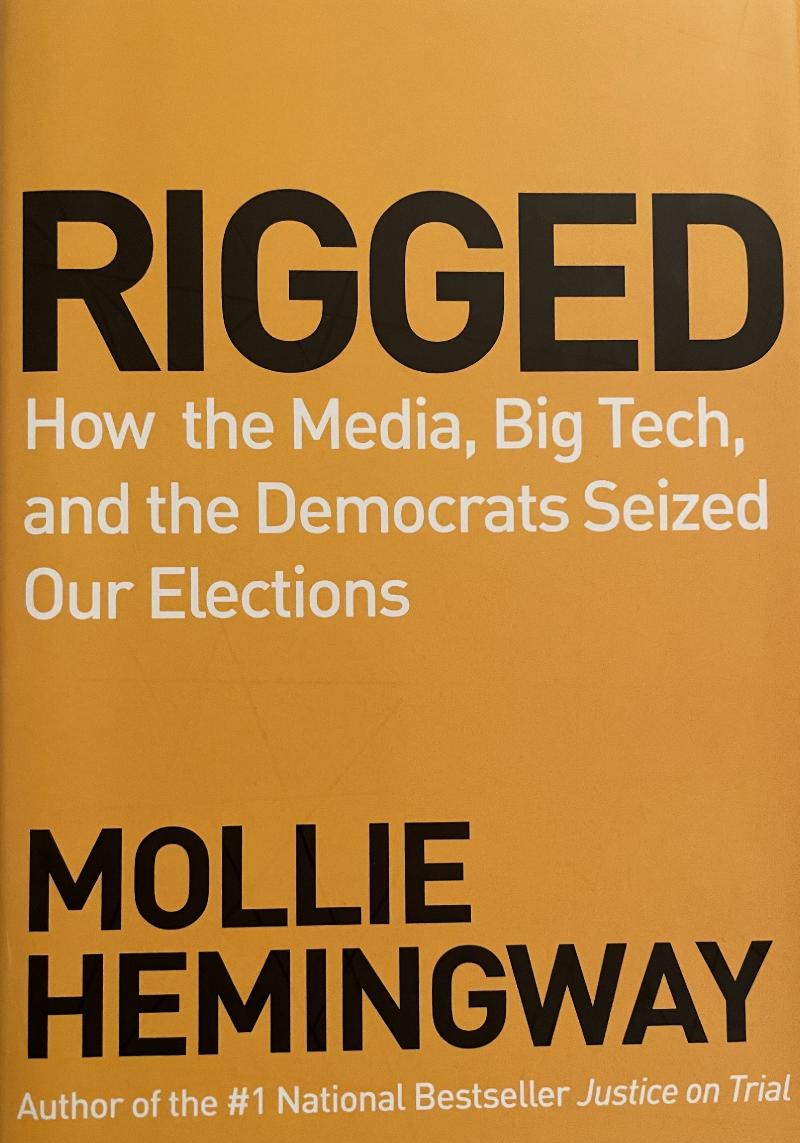Exclusive book excerpt: How Facebook and Twitter rigged the game in 2020
By: By Mollie Hemingway



In her new book , “Rigged: How the Media, Big Tech, and the Democrats Seized Our Elections,” Mollie Hemingway reveals how social-media companies like Twitter and Facebook responded to the 2016 election of Donald Trump to go from free-speech advocates to censors — including blocking The Post’s reporting on Hunter Biden. Here, an exclusive excerpt:
Donald Trump’s 2016 victory was a shock to much of the country, but Silicon Valley took it especially hard. The progressive bastion of San Francisco had turned tech companies from libertarian idealists into liberal crusaders. The industry as a whole felt complicit in Donald Trump’s rise and was intent on doing everything in its power to suppress his voice and those of his supporters.
From the beginning, the tech overlords were plotting how to strike back.
In one meeting, Google founder Sergey Brin suggested that “Jigsaw,” a project Google had developed to combat Islamic terror propaganda, could be used to shape the opinions of Trump voters. By the time Trump was inaugurated, a former Google engineer had told Breitbart reporter Allum Bokhari that activists within the company had formed a working group to brainstorm ways to use Google’s resources to undermine the Trump administration.
Another Google engineer wanted to sabotage Trump’s phone, which ran on Google’s Android operating system, as well as ban the Gmail accounts of senior Trump administration officials. An employee in Google’s advertising department personally referred purchasers of Google ads to the Web site of Sleeping Giants, an activist group that encourages boycotts of conservative news outlets.
It wasn’t any better over at Facebook, where some employees literally took a week off to grieve.
Soon after the election, BuzzFeed was reporting , “Facebook employees have formed an unofficial task force to question the role their company played in promoting fake news in the lead-up to Donald Trump’s victory in the US election last week.”
The group was operating in open defiance of CEO Mark Zuckerberg, who said the idea that Facebook had unfairly tilted the election in Trump’s favor was “crazy.”
By December 2016, Zuckerberg had caved. Facebook adopted a new policy of trying to combat the alleged “fake news” that troubled Facebook’s left-wing employees. The tech giant would start paying media outlets to “fact-check” news on the site. With media revenue steadily declining — in no small part because Facebook had radically disrupted the traditional journalistic business models — once reputable news organizations signed up to participate in the fact-checking program.
Media outlets that were supposed to be objectively covering Facebook were now on Facebook’s payroll, given the power to determine all the news that was fit to print.
Whether or not the tech companies wanted to admit it, much of Silicon Valley’s anger over Trump’s victory was about their inability to control American opinion.
In the past two elections, the tech industry had loudly and publicly taken credit for helping Obama’s two victorious campaigns.
For years, the dreamers that built Silicon Valley had prided themselves on the potential of the Internet to become a digital libertarian oasis that offered people a way of opting out of the institutions that had historically sought to control what they thought and did. This was always a bit of a pipe dream, but when a Twitter executive famously referred to the social media platform as the “free speech wing of the free speech party” in 2012 , Americans still largely believed the Internet was a force for good.
But Silicon Valley’s Orwellian reaction to 2016 proved once and for all that the visionaries at America’s tech companies were oppressors, not liberators. In 2018, a whistleblower at Google leaked a document titled “The Good Censor,” and it summed up Google’s role in mediating America’s discourse this way:
“Free speech has become a social, economic, and political weapon.”
In January 2018, Project Veritas , a journalism outlet that specializes in undercover investigations, released a video of a former “content review agent” at Twitter (CEO Jack Dorsey). The agent admitted that the platform was biased against conservatives, while Twitter employees reviewing questionable content “let a lot of the left-leaning or liberal stuff go through unchecked.”
Veritas’s investigation also featured a former software engineer at Twitter who admitted that the company “shadow banned” users — a term for when social-media companies employ algorithms to decrease the visibility of certain users without telling them.
Numerous prominent conservatives had seen sudden decreases in engagement on social media and had long suspected that this was happening. In January 2020, Twitter updated its terms of service to formally assert the right to “limit distribution or visibility of any Content on the service.”
And Twitter was hardly an outlier. In December 2018, Google CEO Sundar Pichai testified under oath before Congress that the company doesn’t “manually intervene” in search results.
The next month, a Google employee leaked internal discussions to Breitbart showing that the company did, in fact, interfere with search results. Google-owned YouTube, the world’s second most popular search engine after Google itself, had a “blacklist” — Google’s term — related to a number of political topics. If you searched YouTube for abortion, Democratic Congresswoman Maxine Waters, gun control activist David Hogg, or other political topics, Google was rigging the results.
But that was just the tip of the iceberg. “We have tons of white- and blacklists that humans manually curate,” said one Google employee. “Hopefully this isn’t surprising or particularly controversial.”
Another employee noted that the YouTube intervention on abortion search results happened shortly after left-wing publication Slate asked Google to comment on the prominence of pro-life videos on the platform.
Google also appears to have intentionally reduced the search engine rankings and visibility of conservative media. A September 2020 report in RealClearPolitics by Maxim Lott sifted through the data of the consulting firm Sistrix, which tracks data related to search engine optimization. The data clearly show that, starting in 2017, “conservative news sites including Breitbart, the Daily Caller, and the Federalist have seen their Google search listings dramatically reduced.” And Google was making it absurdly difficult to find specific information on conservative outlets.
The decision to blackball conservative websites was almost certainly intentional. In 2018, The Daily Caller obtained more leaked internal communications showing that Google workers had debated burying conservative news sites. An employee described Breitbart and The Daily Caller specifically as “opinion blogs” that should not be elevated next to corporate media in search results, even though both websites do vital reporting and regularly break major political news, while major corporate media outlets have become hyper-partisan and routinely push fake news.
It’s undeniable Google is rigging results on politically sensitive topics, and that the results of this are politically disadvantageous to conservatives. The effect of this on elections appears to be far more significant than most realize. Starting in 2012, psychologist Robert Epstein, the former editor in chief of Psychology Today, conducted a series of experiments to ascertain the degree to which biased search engine results can shape political opinion. Most people wrongly view search engine results as the product of mechanical neutrality, merely the ranking and ordering of results, and are easily influenced by them.
Epstein, a politically liberal Harvard Ph.D., would later report that during 2016 “all 10 positions on the first page of [Google] search results in both blue states and red states” were biased toward Hillary Clinton.
Based on conclusions from his previous experiments, Epstein estimated that Google alone may have swayed 2.6 million Americans to vote for Hillary Clinton.
In 2019, Epstein would tell the Senate Judiciary Committee that search engine manipulation is “one of the most powerful forms of influence ever discovered in the behavioral sciences.”
In 2020, Epstein monitored Google results using over seven hundred volunteers in three swing states and concluded, “Google search results were strongly biased in favor of liberals and Democrats. This was not true on Bing or Yahoo. . . . The bottom line at the moment is that these manipulations, the ones that we’ve so far quantified, could easily have shifted at least six million votes in just one direction.”
Further, Epstein observed what he claimed was overt manipulation by Google. “We also found what seems to be a smoking gun. That is, we found a period of days when the vote reminder on Google’s homepage was being sent only to liberals — not one of our conservative field agents received a vote reminder during those days,” he said.
As the 2020 election drew near, social media companies — driven by internal pressure from employees as well as external pressure from liberal activists — started targeting Trump directly.
For most of the rest of election year, Twitter would regularly block or otherwise censor the president’s tweets. The censorship exposed egregious double standards. At a hearing before the Israeli Knesset in July, a representative of Twitter was asked why the company was censoring Trump but had done nothing about Iran’s Ayatollah Khamenei, who had repeatedly called for the destruction of Israel and Jewish genocide.
Just over a week before Trump’s censored tweet about looting from the George Floyd riots , Khamenei had tweeted , “The only remedy until the removal of the Zionist regime is firm, armed resistance,” and Twitter did nothing .
The response from Twitter to the Knesset was disingenuous, to put it mildly. Khamenei got a free pass because “comments on political issues of the day, or foreign policy saber-rattling on economic or military issues are generally not in violation of our Twitter rules.”
Again, the more likely explanation is that Twitter, much like the executives at all the other tech companies, despised Trump and his politics.
Facebook once touted its ability to shut off 80 percent of the Internet traffic to any link it deems misleading. When deciding whom to censor, Facebook relied on media “fact-checkers” who consider themselves the opposition party. Biased journalists were given the power to scrub their rivals from the Internet, thanks more to the legacy of their places of employment than their own work.
This process of erroneous or slanted liberal media reports informing Facebook “fact checks” played out through Trump’s entire presidency and reelection effort. It suppressed dozens of news stories in the public interest and helped get Biden over the finish line.
“At Facebook, we took our responsibility to protect the integrity of this election very seriously . . . We’ve built sophisticated systems to protect against election interference,” CEO Mark Zuckerberg told ABC News shortly after the election. He highlighted his censorship work, which he described as a fight against “misinformation.”


